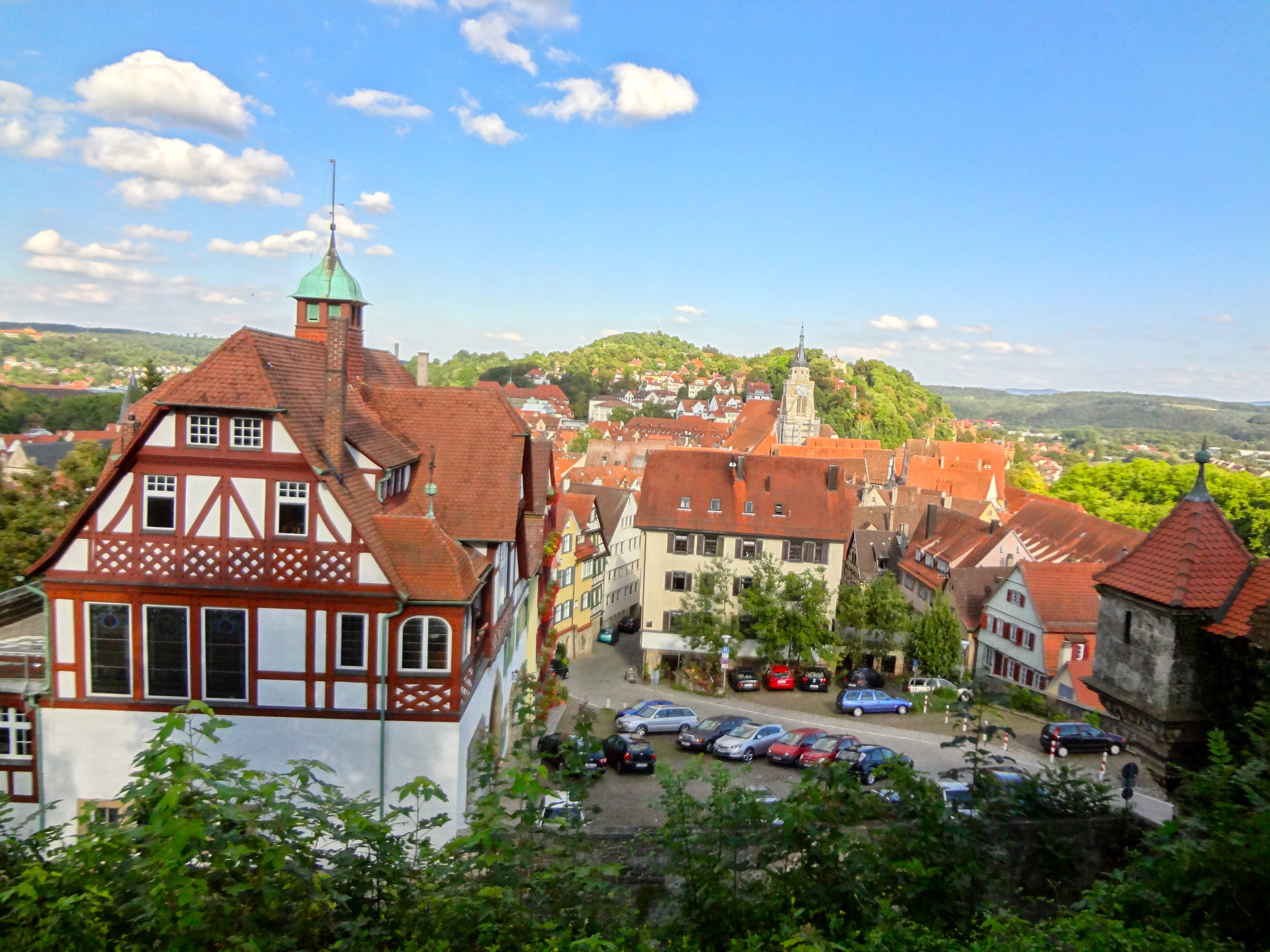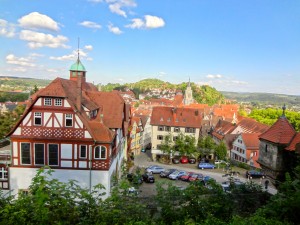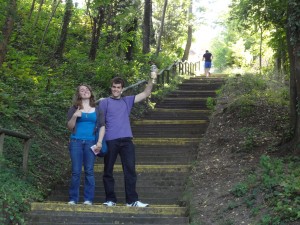With the beginning of the “Deutsch Kompakt Kurs” this Monday came the end of my two-week summer vacation in Germany. After the hardest semester of my life this spring and an exhausting summer full of hard work and preparation for my year abroad, it was really nice to have a few weeks to myself to relax and settle in to my new “home” in Tübingen. Yes, indeed, my few short days of summer are over.
The week began pretty slow, with some bureaucratic paperwork, a placement test, and a dinner for everyone in the course to get to know each other. Then on Wednesday at 9:00 AM sharp, we all hit the ground running at our first day of German Grammar bootcamp. The class Jake and I were placed into can be relatively difficult (in my opinion,) as well as slightly intimidating at times. One of our classmates is a Norwegian with a bachelors degree in German, who as you could imagine, speaks nearly flawlessly. Another one is a Swedish girl who grew up in Switzerland speaking German her whole life. Us Americans in the course are not quite there yet…
Luckily, everyone in the course is extremely nice and friendly. The atmosphere is very comfortable, so nobody feels shy to speak up in class – we’re all of the understanding that as a bunch of foreigners here to learn German, we will all inherently make lots of mistakes. Sometimes it seems strange to speak German when the five of us Valpo students are together, or when we are with other Americans. It is much easier, however, to speak it with Koreans, Swedes, Belgians, Russians, and Brazilians, for example. (All you have to do is pretend they don’t speak English… Which they all do.) All in all, I’ve gotten to know a lot of very interesting people, and I’ve really learned a lot in the last week.
For this blog post, I’ve decided to do a “Top Ten” list of sorts, consisting of things I learned / found interesting / observed etc. this past week. Naturally, I learned a lot of new grammatical rules and conversational German phrases, but I’ll leave most of those out for the sake of not boring the non-German major blog readers. Many of the things listed below have something to do with the cultures represented in our course, as these are the people I’ve been talking to / getting to know over the last week!
1) Scandinavians (minus the Finns, i.e. Norwegians, Swedes, and the Danes) can all speak to each other and understand each other in their native languages. The three languages are pronounced very differently (almost as if they are dialects of the same language) but are still very similar. So similar, that the three nationalities have no problem communicating as long as they speak slow enough to “translate.” There’s also a really neat saying meaning, “Thanks for today,” that the Scandinavians say to each other at the end of the day that is also somewhat similar in each of the three languages.
2) Although Europeans in general are known for their ability to speak multiple languages, the Belgians and the Dutch are particularly well-known for their language abilities. For example, many Belgians can speak four languages (one Belgian girl in another class can speak six.) Because Belgium is such a small country, nearly everyone can speak both Flemish and French, regardless of whether they come from the French-speaking region, or the Flemish. They begin learning English at a very young age, and many then choose to learn German and perhaps even more languages. This fascinates me more and more each day as I attempt to learn my second language. Learning German has given me a very strong appreciation of multi-lingual people, because learning a language can feel very deceivingly and unbelievably difficult.
3) In German, there are two ways to say “you:” “Sie,” when you want to be formal, and “Du” when you are speaking casually with a family member, friend, or someone who has given you permission to speak to them on a more personal level. The distinction between “Sie” and “Du” is often times a very difficult one that hinges on multiple factors. As we were explained, using “Du” with someone is like a gift: if you are speaking to a superior, coworkers, someone older than you, or those with authority, you should always begin with “Sie.” If and when they tell you it is okay to use “Du,” (which depending on the situation, can be a big deal) it is impolite and rude to continue saying “Sie,” against their wishes. When speaking to kids, family members or other students you always use “Du,” but here are some of the more interesting distinctions we learned between the two forms:
- When hiking in the mountains, you always greet passersby with “Sie,” unless you are higher in elevation than 1500 meters above sea level, in which case you always use “Du.”
- Certain political parties in Germany have adopted either one or the other forms of you. For example, the more conservative CDU and FDP parties use Sie, and the more liberal Greens, SPD, and the “Lefts” use du. This applies not only to politicians and those who work for the political parties, but sometimes to the voters as well. An example directly from our teacher: If you typically vote Green, (as the majority of people actually do in this region of Germany,) and you know somebody to be CDU, you probably wouldn’t want to introduce yourself immediately as a Green voter by using “Du.”
4) (This one isn’t something I “learned,” per se, more something I’ve observed and find interesting.) Many countries, such as Brazil, are much more lax about citizenship than the United States, and allow for multiple citizenships and passports. One girl in our class is from Brazil, for example, and because her great-grandmother came from Italy, she is eligible for an Italian passport – which she is currently waiting to receive by mail. Just Imagine: how many people would love to have dual citizenship in the United States because their great-grandparents were born in another country? I might be wrong, but I don’t think it’s even possible anymore to have dual citizenship if your parents are from another country, much less grandparents or great-grandparents.
5) The alcohol laws across Europe are interesting, and quite varied. In Germany, it is apparently no problem to walk around in public with alcohol, as long as you aren’t belligerently drunk and/or causing problems. Last night, for example, a big group of us from Deutsch Kompakt went out for dinner. Afterwards, we found a bar where they were selling “Cocktails to Go,” for €5. We each bought one, and drank them as we sat on the steps near the marketplace for nearly three hours. In the United States, I think you’d be hard-pressed to find “Cocktails to Go,” (especially with our culture being dependent on cars and driving) or municipalities that would allow the free roaming around in public with Piña Coladas. I’ve always found it crazy that in Indiana, it is illegal to buy alcohol on Sundays. Surprisingly, in Norway, a country known to be quite liberal in comparison to the United States, you cannot buy alcohol not only on Sundays, but also after 8:00 PM on weekdays or after 6:00 PM on Saturdays.
6) Wifi is practically impossible to find here in Germany. This, and the fact that credit cards are often not accepted in the country home to Europe’s banking capital, are somewhat surprising to me. Germany is an extremely modernized country. In many ways, for example, its solid infrastructure and economy, I would say it is even more modernized than the United States. (Now gasp, and call me un-American. Just kidding. Kind of.) Still, it has somehow managed to leave widespread Wifi and credit/debit card acceptance in the dust. Interestingly enough, it’s not just us Americans who think this. A girl from New Zealand whom we met couldn’t understand why credit and debit cards are not widely accepted here, and the two Belgians in our class tried to take their laptops to Burger King in an unsuccessful search for Wifi.
7) Bureaucracy like you’ve never seen. The Germans love bureaucracy. The more complicated, the more forms, photos, permissions, numbers, passwords, and long lines, the better. Simple things like “Matriculating” that take 5 seconds in the United States can take much longer here. We were commiserating with the Belgians and Scandinavians about this as we stood in line with our envelope full of paperwork (complete with biometric photo) to register as official students – complete with internet access that will arrive in no less than one week. In other parts of Europe as well as at home, this is all done online. We login to DataVU, and click, “YES, I WILL be returning in Fall 2011” or, “NO, I will NOT be returning in Fall 2011.” Then we click to confirm our registration in all of our classes. Then we click “Submit.” Done. The Germans, however, love their paperwork and they love their personal contact. I guess I can see the benefit of personal contact in a world that seems to be losing its ability to interact with others. I just wish it would be a little less complicated and time-consuming. Oh, and did I mention that there is an “Exmatriculation” process that has to be completed when we leave next July?
8) English is truly the international language. It is so interesting to me that every time the Czech, Belgian, or Swedish students talk to each other, it is in a language that nobody else understands. When we Americans talk amongst ourselves in English, it’s not hard to see the heads turning and subtly leaning in to listen in on our conversation that everyone else can also understand. It fascinates me greatly that when the Italians have trouble speaking in German to the Danes, for example, or the Norwegians to the Czechs, they automatically switch to English to explain themselves. The Italians typically don’t learn Danish, just as the Danish typically don’t learn Italian, the Norwegians typically don’t learn Czech and the Czechs typically don’t learn Norwegian. They’re all here to learn German, a third or fourth language that is not their own, but when that fails they turn to their second or third foreign language: English. This presents a difficult challenge for Americans learning other languages (I mentioned this in my last entry,) but I also think it’s incredibly motivating to try hard to keep up with them!
Tomorrow we leave for our six-day-long class trip to Blaubeuren, a small town in the mountains where the University of Tübingen owns a house. From what we can tell it sounds like it will be a retreat or sorts, kind of a like a one-week German “camp,” complete with hikes to a waterfall. I don’t know much else, but I do know that I’ll be without internet until Friday. I’ll post an entry about the week upon my return!
Bis dann!



Leave a Reply